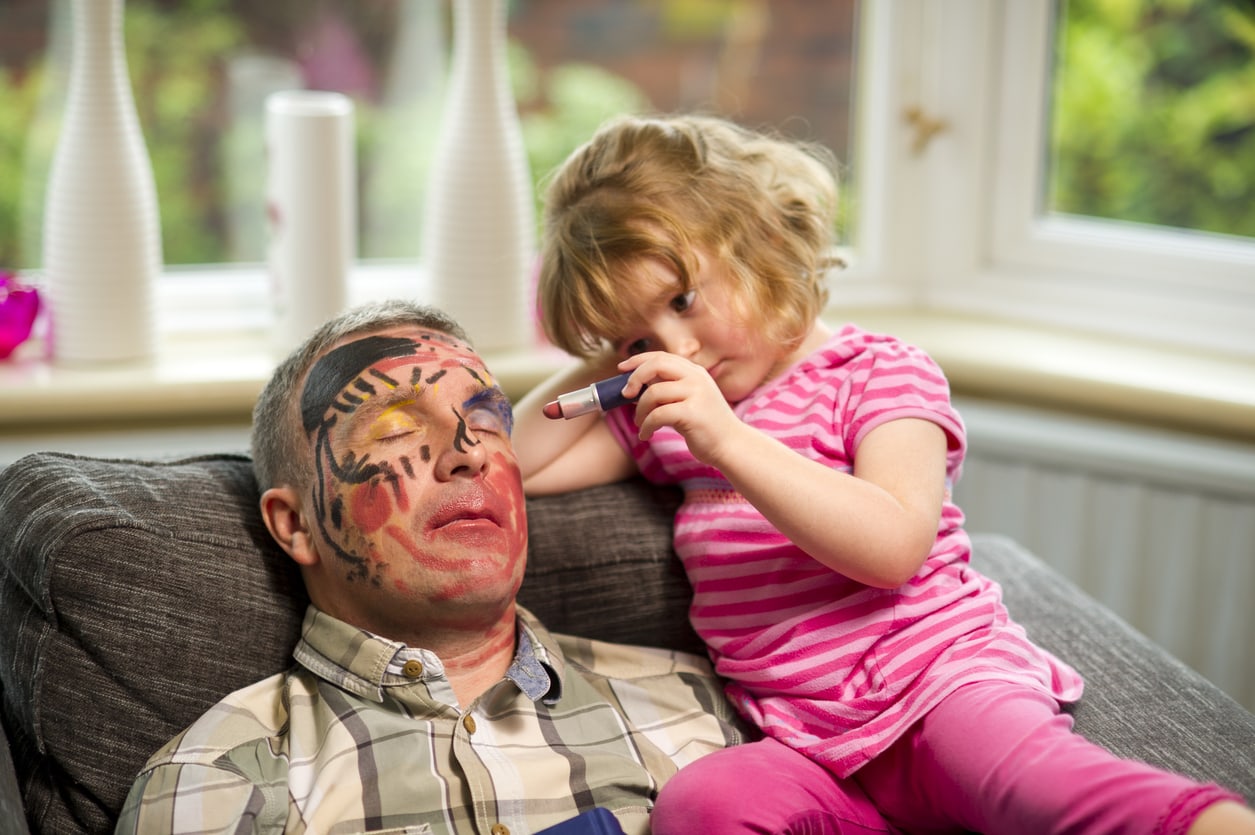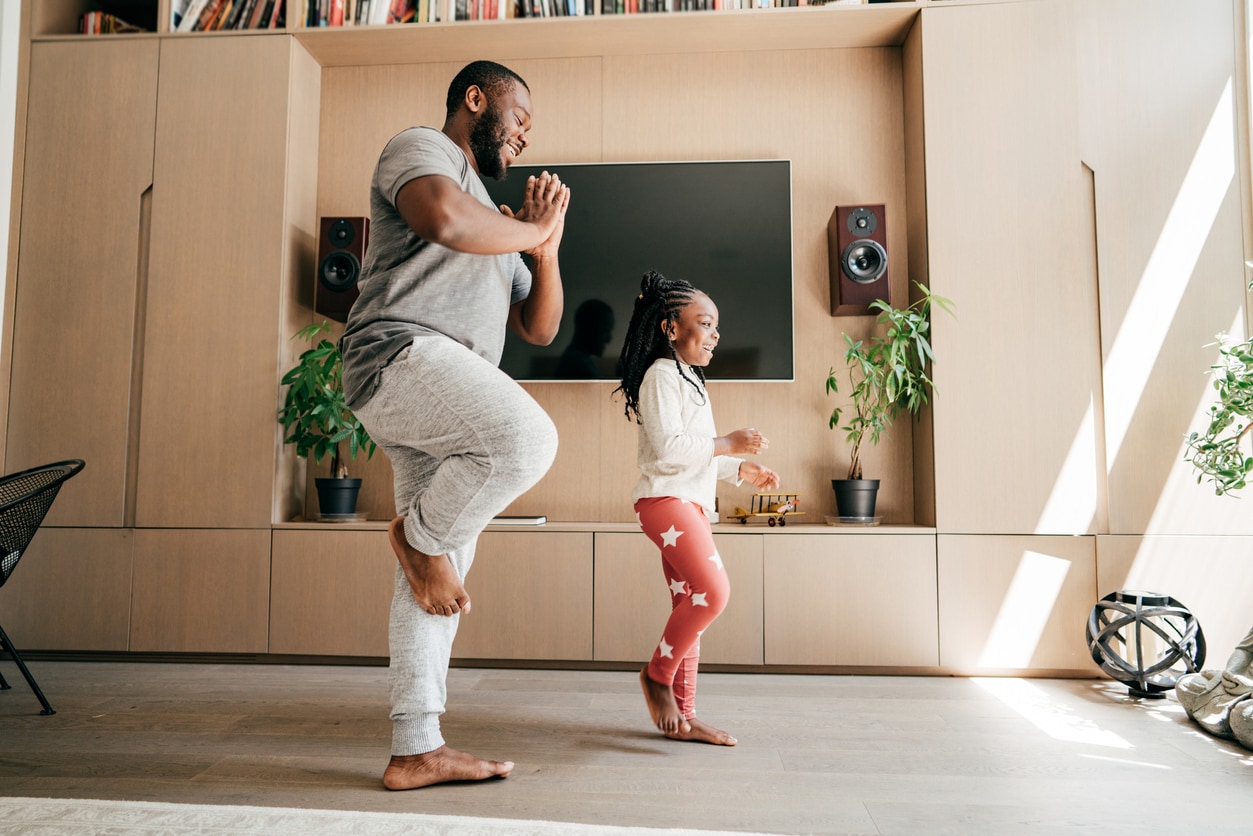
If I could just get five minutes to myself.
I remember thinking this half a dozen times last week while playing with my 3-year-old daughter, Adley. Playing with her is usually something I genuinely enjoy. But after she was up three times overnight and then decided to stay up for good at 5:15 a.m., enjoyment wasn’t what I felt.
Exhaustion is all I felt. Then, like a miracle from the heavens, my break came. Not from my wife, or family, or friends. But from Adley’s imagination. “Daddy, if you don’t turn on the TV, I’m putting you in timeout!”
Find a Break When You Can
This unexpected but perfectly timed threat was exactly what I needed. So, like any exhausted parent would do, I called her bluff. “We’re not going to watch TV right now, but I guess Daddy will go in timeout,” I told her, sounding as remorseful as possible.
I wanted to sell this so I wouldn’t miss my chance, and it worked like a charm! I sat on the stairs outside the playroom for five minutes “thinking about what I had done.” Really, I just spent the time looking at my phone while Adley continued playing with her toys. It was the recharge I needed, and I came back in a better head space.
A Parenting Break is Self-Care
This may seem like a toddler hack or a shortcut, but in reality, it’s self-care. As a stay-at-home dad, I’m constantly prioritizing the well-being of Adley and my wife, Katie, because, in my mind, that’s part of the job. But that doesn’t mean I’m not looking for little moments to myself, especially when they are needed after a long night.
According to a recent survey from Philips Avent, 88% of parents with children three and under agree they are better parents when they can focus on self-care. In this survey, self-care included:
- Getting more sleep
- Exercising
- Eating healthy
While acknowledging what’s required, far fewer parents felt they made enough time for these things, and 70% said they felt pressure to put their child’s needs above their own.
I don’t think these survey results will surprise many parents. However, it puts into perspective the push-pull parents often feel, especially those who are full-time caregivers. How do you prioritize self-care while still being there to take care of your child? If you’re like me, you’ve read plenty of tips, like putting the kids to bed early or finding a babysitter so you can get some alone time.
Everyday Activities Can Help You Recharge
While these ideas are useful, I’ve stumbled upon some everyday activities that can help you recharge your batteries while also being a present parent.
Exercise

Let’s start with exercise. For most of the three-plus years I’ve been a father, working out has been Dad’s time. I wait for my wife to finish work, hand Adley over, and go on a run or ride our stationary bike. But now, Adley is at an age where she enjoys helping me.
Last month, I pulled up a strength training workout on our TV. I cleared space in our living room, found two sealed Play-Doh containers, and gave them to Adley to use as weights. To my surprise, she loved it!
Between the instructor on the TV and watching me, she was able to follow along and had fun doing it. Best of all, I could exercise and get a mental break from entertaining her for 30 minutes while including her in the process. I won’t tell you I would prefer to exercise with my 3-year-old. That would be a lie. But absent other options, this worked really well to settle my mind and relieve a little stress.
Chores and Meal Prep

I also started including Adley in some of my daily chores, like cooking and laundry. When I’m preparing meals for the week, she helps me measure the ingredients and mix them together.
When I’m gathering the laundry, it’s her job to take her dirty clothes out of the laundry hamper and put them in the washing machine. These may not seem like examples of self-care on the surface. But they are chores I previously did when Adley was asleep or with Mom.
Including her in the process leaves more time to focus on an activity I want to do when my wife is finished with work or when Adley is asleep. It’s better time management to make the most of the little self-care time I have. Ultimately, finding time for self-care makes us better and more forgiving parents.
A 2021 study from the Parent Researching Centre in Australia found a link between self-care and self-criticism. Parents who made time to take care of themselves were lower on self-criticism, leading to better mental health. It’s not a leap to say parents who focused on self-care could probably function as the best versions of themselves as well.
To use a sports metaphor, you don’t always have to hit a home run to take care of yourself. Sure, getting a babysitter for an evening out is a fantastic way to recharge. But reading this article while sitting in timeout isn’t so bad, either.

 PARENTING TIPS
PARENTING TIPS PREGNANCY
PREGNANCY BABY CARE
BABY CARE TODDLERS
TODDLERS TEENS
TEENS HEALTH CARE
HEALTH CARE ACTIVITIES & CRAFTS
ACTIVITIES & CRAFTS


